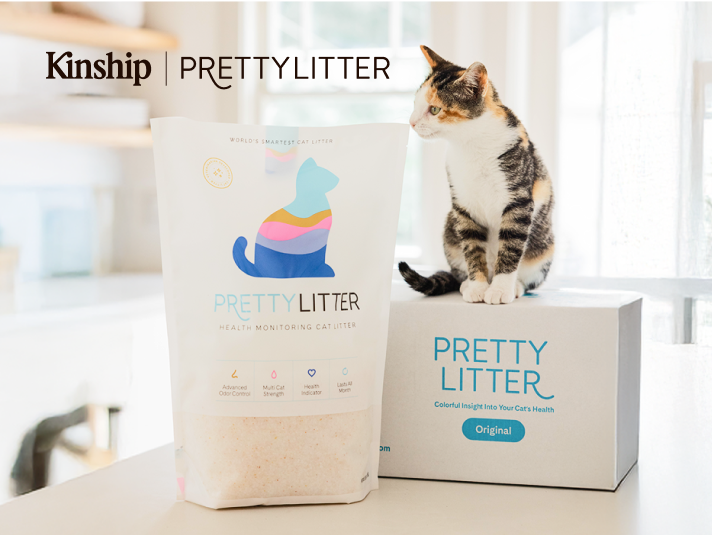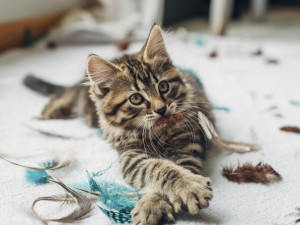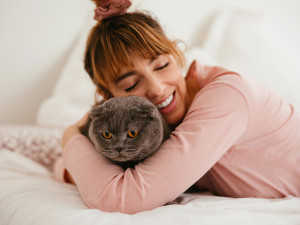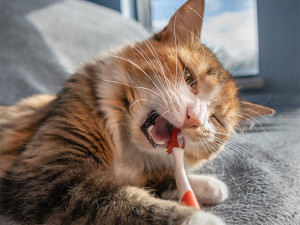How to Make Your Cat’s Oral Care as Stress-Free as Possible
Your cat’s oral hygiene is essential to their health. Take things slow and figure out what works best for your kitty’s pearly whites.
Cats are sensitive creatures. A trip to the vet? Stress. New feline sibling? Stress. Different litter box? Stress. Thunder? Stress. So, it’s no surprise that toothbrushing is stressful for cats, too.
In the webinaropens in new tab What’s Causing Your Cat Stress? Making Connections Between Oral Health & Stress-Related Behaviors, certified cat behavior consultant Mikel Delgadoopens in new tab, PhD, highlights the importance of feline oral health and offers suggestions to make dental care a less stressful experience.
Save on the litter with color-changing tech that helps you better care for your cat.
Her biggest advice: Go slow. “Unfortunately, I think people [believe] ‘I have to do this and I have to do it now… so therefore I’m going to hold my cat down [to get it done], which 99.999 % of the time is going to backfire and make things worse,” Dr. Delgado says.
Although toothbrushing is the gold standard when it comes to good oral care, restraining your cat, forcing their mouth open and scrubbing their teeth is super stressful, making it a hard routine to maintain. It’s best to start with something a little easier.
Purchase different brands and flavors of toothpaste to find one that your cats like best; squeeze a small amount on your finger and offer it to them as a treat. The flavor should entice them to come running when they see the toothpaste tube. Dr. Delgado also suggests using your finger or a Q-tip (with a small amount of toothpaste) and gently sliding it into your cat’s mouth and move it across their teeth before progressing to a tooth brush. When you do start brushing your cat’s teeth, remember to choose a toothbrush designed for pets, not the drugstore versions that were made for much larger human teeth.
Dental treats and water additives are other options to add to your cat’s oral care routine. “[I want to do] anything and everything that I can so that even if I’m not brushing my cat’s teeth every day, most days I’m still doing something to improve their dental health,” Dr. Delgado says. “Tackle the problem from as many angles as possible.”
It might be tempting to skip the stress that comes with brushing your cat’s teeth, but poor oral hygiene is linked to a host of health issues from dental plaque and calculus to gingivitis and periodontitis.
Feline oral health issues can also be very painful and cause your cat to drool, lose their appetite, or show other behavior changes from hiding or biting to avoiding the litter box. “Not only can it be stressful to try to brush your cat’s teeth every day…if your cat is suffering from any dental pain, that can cause stress as well,” she says. “And dental pain that’s not addressed…doesn’t go away and that can be a huge stressor for cats.”
Even if there are no outward signs that your cat has dental disease, Dr. Delgado points out that it might still be taking a toll on their health. “The other thing that’s really important to recognize is when the mouth has a lot of bacteria and infection in it, it doesn’t just affect the cat’s mouth,” she says. “It becomes a systemic problem that impacts all of their organs and can become very dangerous, even deadly.”
The best way to ensure good oral health is to take your cat to the vet for regular dental checkups. “You can’t cure periodontal disease with either teeth brushing or dental treats… your cat is going to need a cleaning,” she says. “Once your cat has to severe periodontal disease, you’re not going to be able to treat that at home.”
Vet visits are a potential source of stress for cats; Dr. Delgado suggests asking your vet for a calming medication that you can offer before the appointment. She says you can also take steps to get your cat comfortable with their carrier so they don’t start to feel stressed on the trip. Dr. Delgado also advises searching out practices that are certified fear-free to ensure that all aspects of care are designed to be as stress-free as possible because skipping professional dental cleanings is not an option.







